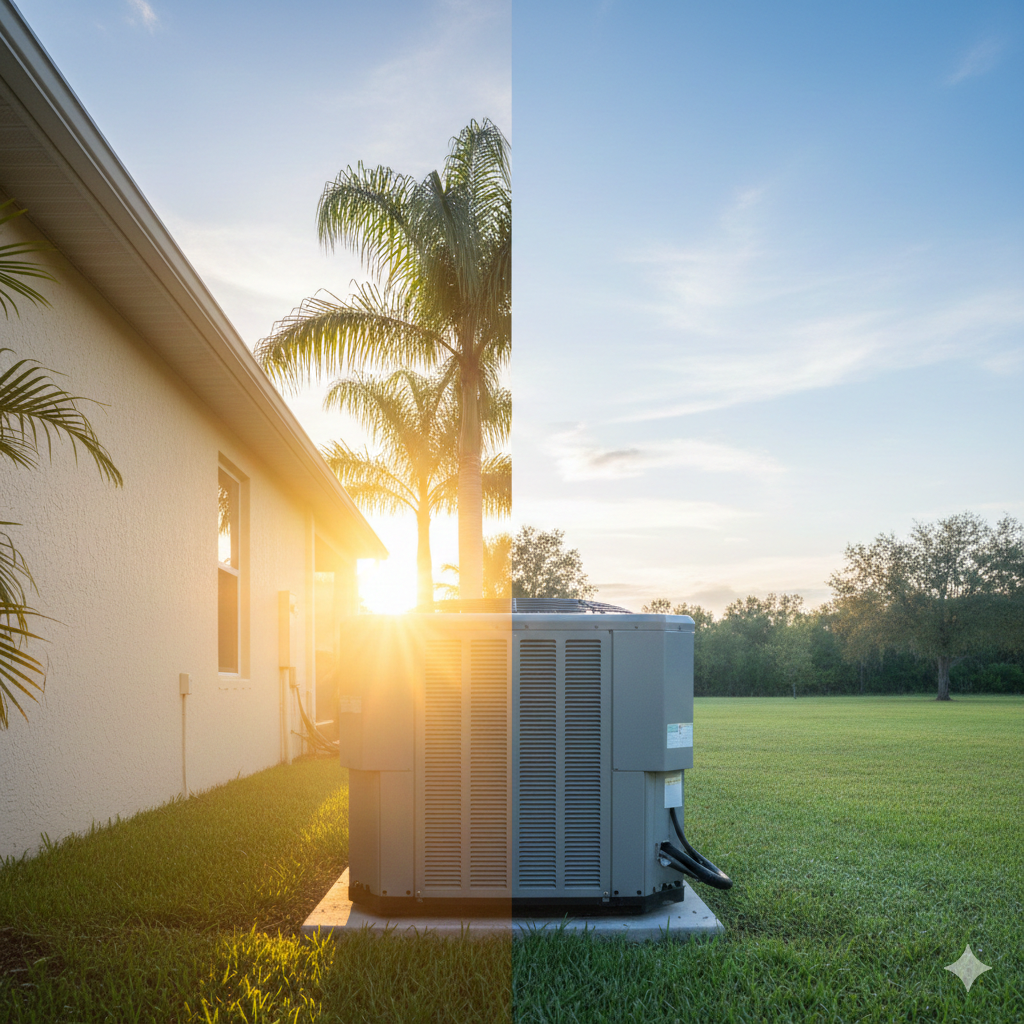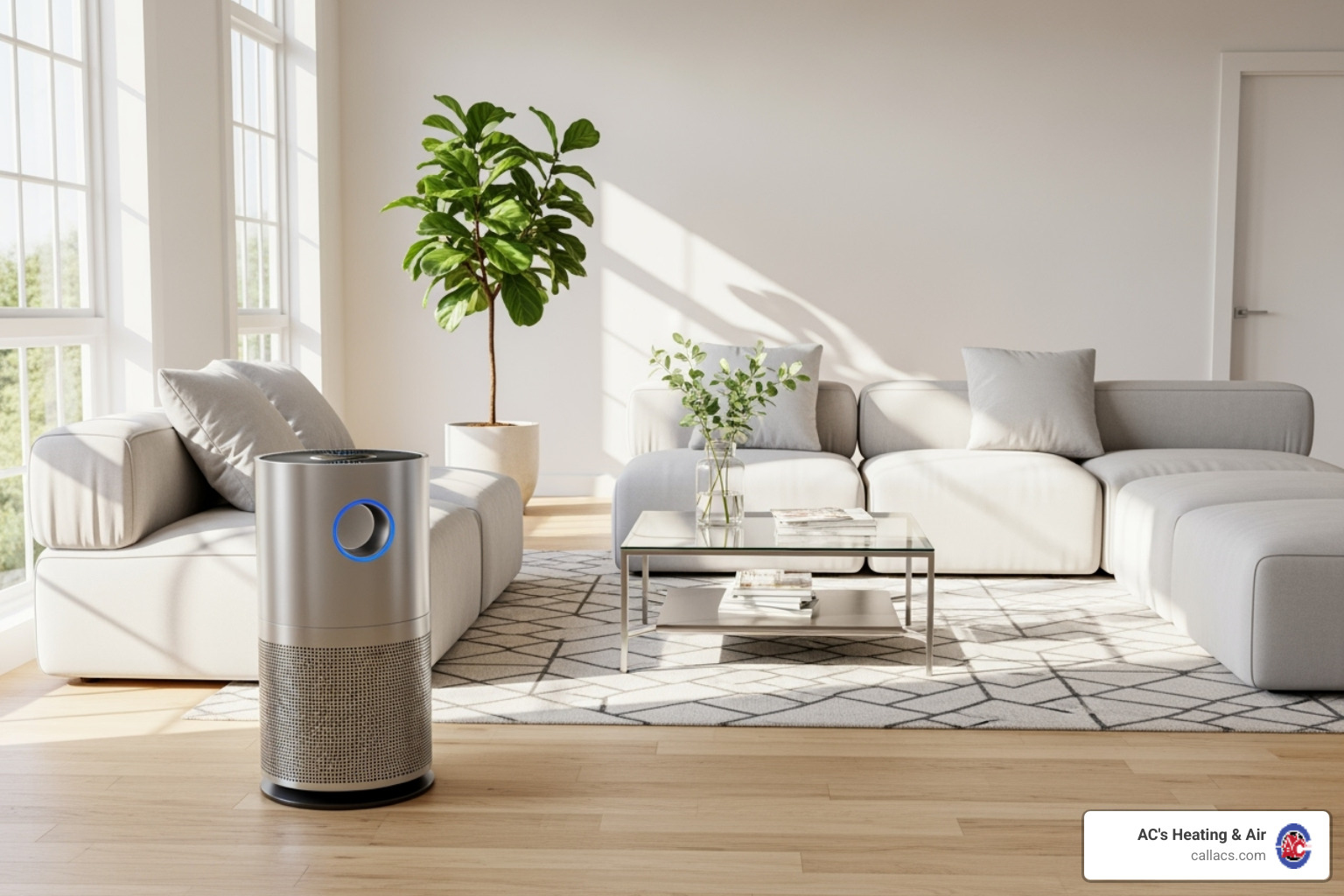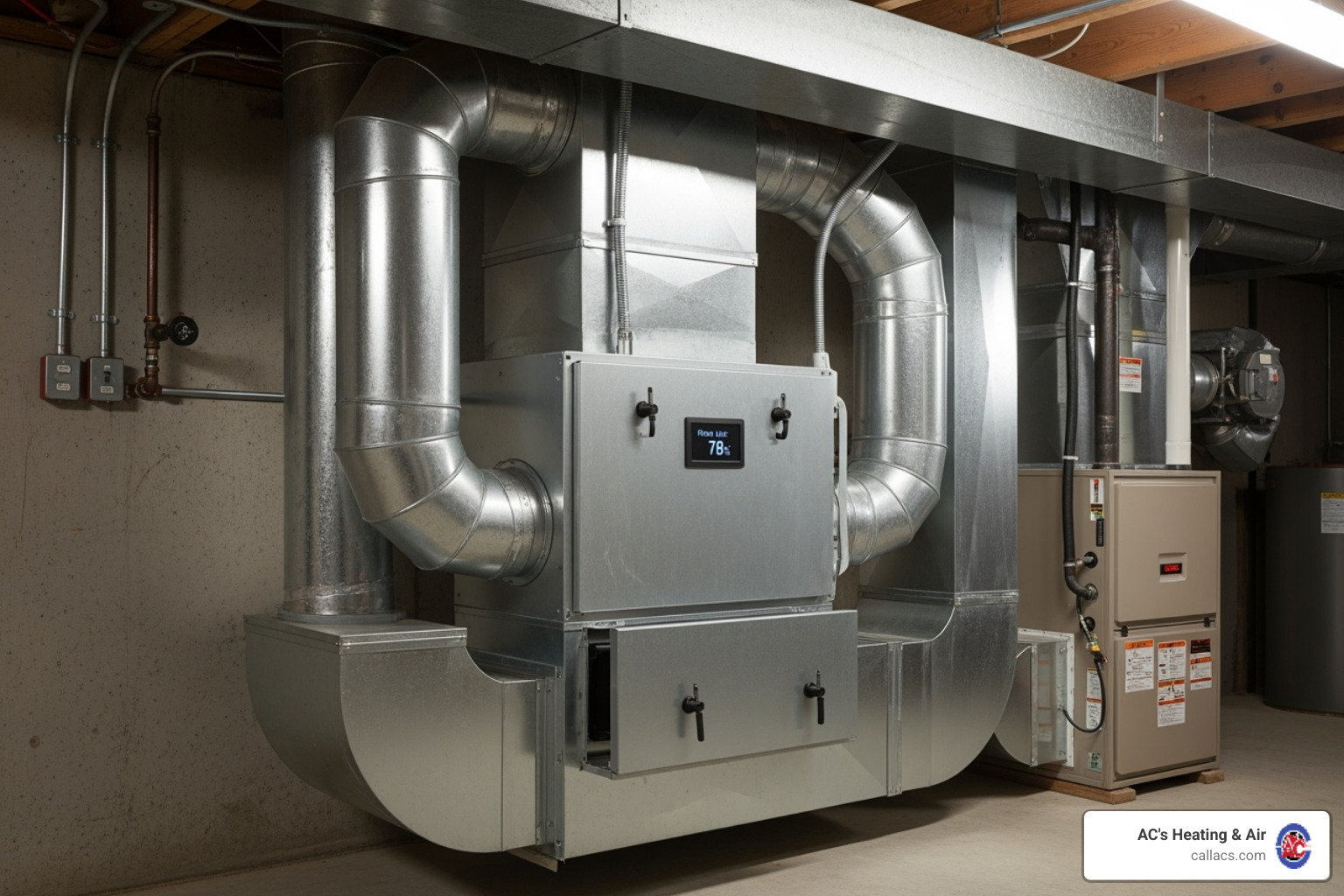Fresh Air: Navigating Indoor Air Quality in Florida

Breathe Easy in 2025: A Guide to Indoor Air Quality in Florida
Florida indoor air quality is a hot topic, and with good reason! It's not just about comfort—it's also about safeguarding health. In a state where humidity averages 74.5%, Florida's unique climate poses specific challenges for indoor air quality. Here are key points to keep in mind:
- Humidity Matters: Keep indoor relative humidity between 45%-60% to prevent mold.
- Ventilation is Key: Ensure proper ventilation to reduce airborne irritants.
- Be Aware of Common Pollutants: Watch out for carbon monoxide, VOCs, and radon.
- Regular Maintenance: Change air conditioner filters regularly to maintain air quality.
The state of Florida, with its diverse environmental conditions, amplifies the need to pay attention to what you're breathing inside your spaces. As identified by the Florida Department of Health, inadequate indoor air quality contributes significantly to respiratory issues and may even increase cancer risks.
I'm Allen Chenault, owner of AC's Heating & Air. With over a decade in the HVAC industry, I've seen how improving indoor air quality can transform homes and businesses. I'm dedicated to delivering top-notch solutions for maintaining Florida indoor air quality. Let's dive deeper into understanding the factors impacting your air quality.

Understanding Florida Indoor Air Quality
Florida's climate is unique, and so are the challenges it presents for indoor air quality. Let's break down the key factors that affect the air we breathe indoors in the Sunshine State.
Humidity Levels
Florida is known for its high humidity, which can wreak havoc on indoor air quality. When indoor humidity exceeds 60%, it creates a breeding ground for mold and dust mites. These allergens can cause respiratory issues and exacerbate conditions like asthma.
How to Manage Humidity:
- Use Dehumidifiers: A whole-house dehumidifier can help maintain optimal humidity levels.
- Ventilation: Proper ventilation can help remove excess moisture from the air.
- Monitor Humidity: Use a hygrometer to keep track of humidity levels. Aim for 30-50% for comfort and health.
Radon
Radon is a naturally occurring radioactive gas. It's colorless, odorless, and tasteless, but it poses serious health risks. In Florida, about 1 in 5 homes has liftd radon levels. Radon is the second leading cause of lung cancer in the U.S., making it a critical concern for Florida indoor air quality.
- Test Your Home: Radon testing is essential. The Florida Department of Health offers free testing kits.
- Seal Cracks: Seal any cracks in floors and walls to prevent radon entry.
- Install a Radon Mitigation System: If high levels are detected, professional mitigation systems can reduce radon levels effectively.
Mold Growth
Mold thrives in Florida's humid environment. It can grow almost anywhere if moisture is present, including walls, ceilings, and HVAC systems. Mold spores can lead to allergic reactions and respiratory problems.
Preventing Mold:
- Control Moisture: Fix leaks and use exhaust fans in bathrooms and kitchens.
- Regular Inspections: Check for visible mold and musty odors regularly.
- Professional Mold Removal: If mold is detected, it's crucial to have it professionally removed to ensure complete eradication.
Understanding these elements is vital for maintaining healthy indoor air in Florida. Addressing humidity, radon, and mold proactively can significantly improve your home's air quality, safeguarding your family's health.

Next, we'll explore common indoor air pollutants and how they affect your health.
Common Indoor Air Pollutants
When it comes to Florida indoor air quality, understanding common pollutants is key. Let's explore three major culprits: PM2.5, VOCs, and carbon monoxide.
PM2.5
PM2.5 refers to fine particulate matter that is 2.5 micrometers or smaller. These tiny particles can come from sources like vehicle emissions, industrial activities, and even cooking. Due to their size, PM2.5 particles can penetrate deep into the lungs and even enter the bloodstream, posing significant health risks.
- Health Effects: Long-term exposure to PM2.5 can lead to respiratory diseases, heart problems, and even premature death.
- Prevention Tips: Use air purifiers with HEPA filters to reduce PM2.5 levels indoors. Regularly clean and maintain HVAC systems to ensure they effectively filter out these particles.
VOCs (Volatile Organic Compounds)
VOCs are gases emitted from a variety of household products, including paints, cleaning supplies, and new furniture. They can significantly degrade indoor air quality and have various health implications.
- Health Effects: Prolonged exposure to VOCs can cause headaches, dizziness, and respiratory irritation.
- Prevention Tips: Opt for low-VOC or VOC-free products when possible. Ensure good ventilation when using products that emit VOCs, and consider air purifiers designed to capture these compounds.
Carbon Monoxide
Carbon monoxide (CO) is a colorless, odorless gas that can be deadly at high concentrations. It's often produced by incomplete combustion in appliances like gas stoves, heaters, and fireplaces.
- Health Effects: Exposure to carbon monoxide can cause symptoms ranging from headaches and dizziness to severe neurological damage and death.
- Prevention Tips: Install carbon monoxide detectors in key areas of your home. Regularly inspect and maintain appliances that burn fuel to ensure they are operating safely and efficiently.
By being aware of these common indoor pollutants and taking proactive steps to minimize their presence, you can significantly improve the air quality in your Florida home. Next, we'll discuss practical strategies to improve indoor air quality and create a healthier living environment.
Improving Indoor Air Quality in Florida
Improving indoor air quality in Florida involves focusing on three main tools: air conditioner filters, dehumidifiers, and air purifiers. Each plays a crucial role in ensuring the air inside your home is as clean and healthy as possible.
Air Conditioner Filters
Your air conditioner's filter is the first line of defense against indoor air pollutants. In Florida's hot and humid climate, air conditioners work overtime, so keep those filters clean and efficient.
- Why It Matters: Dirty filters can circulate dust, pollen, and other allergens, reducing air quality and straining your HVAC system.
- What To Do: Change your air conditioner filter regularly. The frequency depends on your home environment and filter type, but a good rule of thumb is every 1-3 months. Consider using high-quality filters designed to trap smaller particles.
Dehumidifiers
Florida's humidity can lead to mold growth and other moisture-related issues that degrade air quality. Dehumidifiers help maintain optimal humidity levels, making your home more comfortable and healthier.
- Why It Matters: Excess humidity fosters mold and mildew, which can trigger allergies and respiratory issues.
- What To Do: Use a dehumidifier to keep indoor humidity levels between 45% and 60%. For the best results, consider a whole-house dehumidifier integrated with your HVAC system.
Air Purifiers
Air purifiers are essential for removing pollutants like PM2.5 and VOCs that can linger in your home's air. They work by drawing in air and filtering out contaminants.
- Why It Matters: Air purifiers can significantly reduce airborne particles and gases, improving health and comfort.
- What To Do: Choose an air purifier with a HEPA-rated filter for the best performance. For tackling VOCs, look for models with activated carbon filters. Position them in high-use areas like living rooms and bedrooms for maximum effect.
By focusing on these tools, you can dramatically improve the indoor air quality in your Florida home, creating a healthier and more comfortable living space for you and your family. Next, we'll explore specific tactics to improve indoor air quality even further.
11 Tactics to Improve Indoor Air Quality
Improving Florida indoor air quality requires some strategic moves. Here are 11 simple tactics to breathe easier at home:
Change Your Air Conditioner Filter
Regularly changing your air conditioner filter is key. Think of it as the lungs of your HVAC system. AC maintenance plans can help you remember to swap out filters before they get too dirty.
- How Often: Every 1-3 months, depending on your home's dust level and filter type.
- Benefits: Keeps your system running smoothly and improves air quality by trapping dust and allergens.
Eliminate Dust
Dust is a sneaky culprit in poor air quality. Regular vacuuming with a HEPA filter can help keep it at bay.
- Vacuuming Tips: Use a vacuum with a HEPA filter to trap small particles. Don't forget to vacuum under furniture and along baseboards.
- Bonus: Less dust means less strain on your air filter.
Manage Your House’s Humidity
Florida's humidity is infamous for encouraging mold growth. Whole-house dehumidifiers can be a game-changer.
- Why Humidity Control Matters: High humidity can lead to mold and mildew, which are harmful to health.
- What To Do: Aim for 45%-60% humidity indoors. A whole-house dehumidifier integrated with your HVAC system offers the best control.
Use an Air Purifier
Air purifiers are your allies against indoor pollutants. They work by filtering out particles and gases.
- Choose Wisely: Opt for models with a HEPA-rated filter for dust and allergens, and activated carbon filters for VOCs.
- Placement: Put them in high-use areas like living rooms and bedrooms for the most impact.
Seal Air Leaks
Sealing air leaks around your home can prevent outdoor pollutants from sneaking in.
- Common Leak Points: Windows, doors, air ducts, attics, and basements.
- How It Helps: Keeps pollutants out and your conditioned air in, improving both air quality and energy efficiency.
By implementing these tactics, you can significantly improve indoor air quality in your Florida home, ensuring a healthier environment for everyone inside.
Frequently Asked Questions about Florida Indoor Air Quality
What is causing poor air quality in Florida?
Florida's air quality challenges stem from a blend of natural and human-made factors. Combustion from vehicles and industrial factories are significant contributors. In busy cities like Miami and Orlando, the sheer volume of traffic means more emissions. These emissions release pollutants like nitrogen oxides and volatile organic compounds (VOCs) into the air.
Industrial activities also play a major role. Factories and power plants emit pollutants that can degrade air quality. These pollutants can mix with sunlight to create smog, which is especially prevalent in urban areas.
What are the symptoms of poor indoor air quality?
Poor indoor air quality can manifest in various ways. Headaches, fatigue, and respiratory issues are common symptoms. Imagine feeling tired or having a persistent headache without knowing why. These can be signs that the air you're breathing isn't as clean as it should be.
Respiratory symptoms might include coughing, sneezing, or difficulty breathing, especially for those with asthma or allergies. If you notice these symptoms improving when you leave your home or office, it might be time to investigate your indoor air quality.
Does indoor air quality affect health?
Absolutely, indoor air quality has a direct impact on health. Long-term exposure to poor air quality can lead to serious health concerns. Respiratory diseases like asthma and chronic bronchitis can be exacerbated by poor air. Over time, exposure to certain indoor pollutants has been linked to more severe health conditions, including heart disease and even cancer.
The Environmental Protection Agency (EPA) notes that indoor air pollutants can be 2 to 5 times higher than outdoor levels. This is particularly concerning given that people spend about 90% of their time indoors. Therefore, maintaining good indoor air quality is crucial for preventing these health issues.

Conclusion
In the journey to achieving optimal Florida indoor air quality, it's crucial to have the right partner by your side. AC's Heating & Air is committed to providing expert guidance and solutions custom to your specific needs. Our team understands the unique challenges posed by Florida's climate and is equipped to offer solutions that ensure your indoor air is as clean and healthy as possible.
One of the key offerings we provide is custom HVAC maintenance plans. These plans are designed to keep your heating and cooling systems running efficiently, which is essential for maintaining good indoor air quality. Regular maintenance helps in preventing the buildup of dust, mold, and other pollutants that can compromise the air you breathe.
Our maintenance plans include thorough inspections, timely filter replacements, and system optimizations. This proactive approach not only improves air quality but also extends the lifespan of your HVAC system, saving you money in the long run.
For those in Apopka and surrounding areas, we are ready to assist you in creating a healthier indoor environment. Whether it's through routine maintenance or upgrading to advanced air purification systems, our goal is to ensure your home is a safe haven for you and your family.
For more information on how we can help you improve your indoor air quality, visit our service page. Let us help you breathe easier and live healthier with our expert HVAC solutions.



